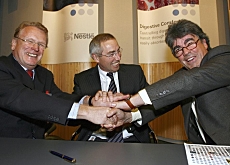Nestlé strikes major brain research deal

Nestlé is investing SFr25 million ($20 million) in a joint project with the Federal Institute of Technology in Lausanne to develop new products that boost brain power.
The five-year partnership is aimed at improving brain performance in children and delaying the degenerative effects of old age and diseases such as Alzheimer’s.
A key area of study will be to identify nutrients that can keep the brain fuelled and functioning at as high a level as possible. According to experts, the organ consumes around a quarter of the body’s energy.
“It is well known that during ageing and after the onset of Alzheimer’s disease, the metabolism producing brain energy slows down, which has a direct impact on cognitive function,” said Peter van Bladeren, director of the Nestlé Research Center near Lausanne.
“This means that by adding energy to the brain, the elderly and people suffering from Alzheimer’s can better deal with the decrease of cognitive performance.”
Van Bladeren said recent studies had shown that the effect of a bad diet on the deterioration of brain function was worse than previously thought.
He told swissinfo that scientists hoped to reverse this trend by finding new products or new properties of existing products to extend brain performance through life.
Risk factors
Risk factors for Alzheimer’s include cholesterol, diabetes, hypertension and obesity. But various studies now show that a higher intake of certain foods can lower the threat of the disease substantially.
Sandrine Andrieu, professor of epidemiology and public health at Toulouse University School of Medicine, highlighted one recent study that showed a 40 per cent risk reduction due to a so-called Mediterranean diet of high levels of fruit, vegetables, fish and moderate wine consumption.
She stressed that nutrition was “a major player” in Alzheimer’s disease, which she said affected 12 million people in the United States and European Union, with one million new cases every year.
“If we do nothing in terms of prevention, due to the increase of obesity and other risk factors and the ageing of our population, the major public health impact of Alzheimer’s will be devastating,” warned Andrieu.

More
Swiss Federal Institutes of Technology
Strategic partnership
Patrick Aebischer, president of the Lausanne institute, hailed the signing of Tuesday’s agreement as the biggest strategic partnership in the institution’s history.
The SFr5 million a year will fund two chairs at its Brain Mind Institute and also finance research projects selected by a joint scientific committee. The agreement also includes research into taste perception and flavour enhancement.
Aebischer said he was in no doubt that the solution to degenerative diseases such as Parkinson’s, Huntington’s and Alzheimer’s lay in food. “Food will be fundamental… in protecting the brain against the ageing process,” he said.
Aebischer told swissinfo that Nestlé’s expertise in identifying natural, non-toxic ingredients and the institute’s understanding of the brain made for a promising partnership.
He said some leads were already being pursued and he hoped the first products could be in development within five years.
“Maybe one day we will have a yoghourt… that will on the one hand be healthy and tasty but at the same time be able to protect some of your nerve cells from dying,” he said.
As for the potential financial windfall from the joint venture, Aebischer declined to say whether the institute would be guaranteed a cut of future sales.
swissinfo, Adam Beaumont in Lausanne
Nestlé is the world’s leading food company and is among the top 30 companies in terms of capital.
Its research centre is located at Vers-chez-les-Blancs near Lausanne, and employs 650 people from, among others, the fields of medicine, biochemistry and microbiology.
Monday’s deal comes in the wake of the 3rd International Nutrition Symposium held at the centre last month on the subject of Food and the Brain.
A key finding was that a good diet has more potential than previously recognised to improve brain function.
Nestlé has 2,400 staff working on research and development worldwide.
The company spent SFr1.5 billion on research and development last year – equivalent to 1.6% of annual turnover.
The Federal Institute of Technology in Lausanne is one of the world’s leading research and teaching universities.
It has a campus of over 10,000 people and a budget of over $500 million.

In compliance with the JTI standards
More: SWI swissinfo.ch certified by the Journalism Trust Initiative










You can find an overview of ongoing debates with our journalists here . Please join us!
If you want to start a conversation about a topic raised in this article or want to report factual errors, email us at english@swissinfo.ch.